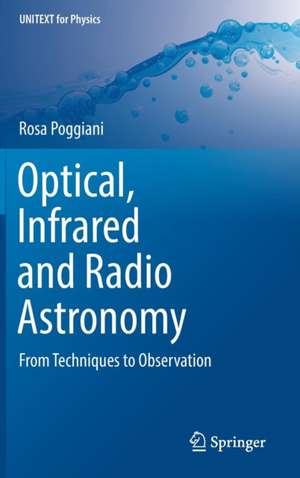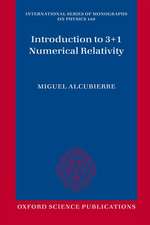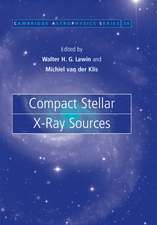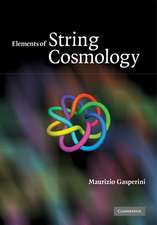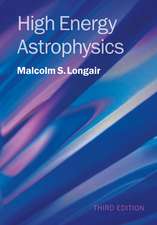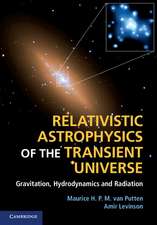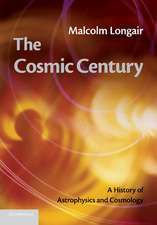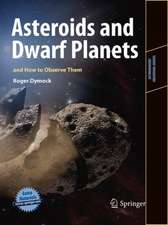Optical, Infrared and Radio Astronomy: From Techniques to Observation: UNITEXT for Physics
Autor Rosa Poggianien Limba Engleză Hardback – 15 dec 2016
For each type of astronomy, the discussion proceeds from the orders of magnitude for observable quantities that drive the building of instrumentation and the development of advanced techniques. The specific telescopes and detectors are then presented, together with the techniques used to measure fluxes and spectra.
Finally, the instruments and their limits are discussed to assist readers in choice of setup, planning and execution of observations, and data reduction.
The volume also includes worked examples and problem sets to improve student understanding; tables and figures in chapters su
mmarize the state of the art of instrumentation and techniques.
| Toate formatele și edițiile | Preț | Express |
|---|---|---|
| Paperback (1) | 494.20 lei 6-8 săpt. | |
| Springer International Publishing – 4 iul 2018 | 494.20 lei 6-8 săpt. | |
| Hardback (1) | 528.63 lei 6-8 săpt. | |
| Springer International Publishing – 15 dec 2016 | 528.63 lei 6-8 săpt. |
Din seria UNITEXT for Physics
- 15%
 Preț: 534.17 lei
Preț: 534.17 lei - 17%
 Preț: 459.62 lei
Preț: 459.62 lei -
 Preț: 351.06 lei
Preț: 351.06 lei - 15%
 Preț: 603.83 lei
Preț: 603.83 lei - 19%
 Preț: 470.37 lei
Preț: 470.37 lei -
 Preț: 358.20 lei
Preț: 358.20 lei -
 Preț: 426.23 lei
Preț: 426.23 lei -
 Preț: 357.86 lei
Preț: 357.86 lei -
 Preț: 358.00 lei
Preț: 358.00 lei - 15%
 Preț: 582.95 lei
Preț: 582.95 lei -
 Preț: 489.87 lei
Preț: 489.87 lei - 17%
 Preț: 362.51 lei
Preț: 362.51 lei - 17%
 Preț: 395.01 lei
Preț: 395.01 lei - 17%
 Preț: 493.74 lei
Preț: 493.74 lei - 13%
 Preț: 355.10 lei
Preț: 355.10 lei - 17%
 Preț: 368.41 lei
Preț: 368.41 lei - 17%
 Preț: 395.64 lei
Preț: 395.64 lei -
 Preț: 458.61 lei
Preț: 458.61 lei - 15%
 Preț: 474.31 lei
Preț: 474.31 lei -
 Preț: 456.66 lei
Preț: 456.66 lei -
 Preț: 404.13 lei
Preț: 404.13 lei -
 Preț: 327.48 lei
Preț: 327.48 lei -
 Preț: 453.39 lei
Preț: 453.39 lei -
 Preț: 491.21 lei
Preț: 491.21 lei -
 Preț: 828.92 lei
Preț: 828.92 lei -
 Preț: 724.07 lei
Preț: 724.07 lei -
 Preț: 489.30 lei
Preț: 489.30 lei - 15%
 Preț: 509.74 lei
Preț: 509.74 lei - 15%
 Preț: 511.05 lei
Preț: 511.05 lei - 18%
 Preț: 796.13 lei
Preț: 796.13 lei - 15%
 Preț: 782.69 lei
Preț: 782.69 lei - 15%
 Preț: 499.77 lei
Preț: 499.77 lei - 15%
 Preț: 597.20 lei
Preț: 597.20 lei - 15%
 Preț: 667.20 lei
Preț: 667.20 lei -
 Preț: 351.06 lei
Preț: 351.06 lei -
 Preț: 387.96 lei
Preț: 387.96 lei -
 Preț: 395.85 lei
Preț: 395.85 lei -
 Preț: 338.43 lei
Preț: 338.43 lei -
 Preț: 399.88 lei
Preț: 399.88 lei - 15%
 Preț: 543.67 lei
Preț: 543.67 lei
Preț: 528.63 lei
Preț vechi: 621.92 lei
-15% Nou
Puncte Express: 793
Preț estimativ în valută:
101.15€ • 105.90$ • 83.70£
101.15€ • 105.90$ • 83.70£
Carte tipărită la comandă
Livrare economică 05-19 aprilie
Preluare comenzi: 021 569.72.76
Specificații
ISBN-13: 9783319447315
ISBN-10: 3319447319
Pagini: 170
Ilustrații: XII, 179 p. 78 illus.
Dimensiuni: 155 x 235 x 13 mm
Greutate: 0.45 kg
Ediția:1st ed. 2017
Editura: Springer International Publishing
Colecția Springer
Seria UNITEXT for Physics
Locul publicării:Cham, Switzerland
ISBN-10: 3319447319
Pagini: 170
Ilustrații: XII, 179 p. 78 illus.
Dimensiuni: 155 x 235 x 13 mm
Greutate: 0.45 kg
Ediția:1st ed. 2017
Editura: Springer International Publishing
Colecția Springer
Seria UNITEXT for Physics
Locul publicării:Cham, Switzerland
Cuprins
Part 1: The basics.- Chapter 1: Setting the scene.- Chapter 2: Pointing the telescope: astronomical coordinates and sky catalogs.- Part 2: Optical Astronomy.- Chapter 3: Optical astronomy: telescopes.- Chapter 4: Telescopes: ground based or in space?.- Chapter 5: Optical astronomy: detectors.- Chapter 6: Optical photometry.- Chapter 7: Optical spectroscopy.- Part 3: The low energy side of classical astronomy.- Chapter 8: Infrared astronomy.- Chapter 9: Radio and submillimeter astronomy: radiotelescopes.- Chapter 10: Radio and submillimeter astronomy: receivers and spectrometers.- Part 4: Instruments acting together: interferometry.- Chapter 11: Interferometry and aperture synthesis.- Chaper 12: Interferometers .- Part 5: Observing.- Chapter 13: Observations: preparation and execution.- Chapter 14: After observation: data analysis.- Chapter 15: Conclusions.
Notă biografică
Rosa Poggiani graduated in Physics from the University of Pisa, Italy, in 1988. Her work has focused especially on the gravitational acceleration of antimatter probes, the detection of gravitational waves with interferometers, and the optical properties of astrophysical compact objects. She has made significant contributions to the physics of low-energy antimatter, suspension systems, high-vacuum compatibility and the cryogenic design of interferometric gravitational wave detectors, the optical spectroscopy of novae and the microvariability of blazars. Dr. Poggiani has been an investigator in a number of research projects and has been involved in various international collaborations. She was Coordinator of Control and DAQ for the P118T experiment on antiproton deceleration and trapping at CERN. She has been a member of the Virgo Collaboration for the interferometric detection of gravitational waves since 1993, and was the Co
ordinator of the last stage of the suspensions and of the vacuum compatibility of the suspension components. The LIGO and Virgo members were awarded the Special Breakthrough Prize In Fundamental Physics and the 2016 Gruber Cosmology Prize for the detection of gravitational waves.
ordinator of the last stage of the suspensions and of the vacuum compatibility of the suspension components. The LIGO and Virgo members were awarded the Special Breakthrough Prize In Fundamental Physics and the 2016 Gruber Cosmology Prize for the detection of gravitational waves.
Textul de pe ultima copertă
This textbook presents the established sciences of optical, infrared, and radio astronomy as distinct research areas, focusing on the science targets and the constraints that they place on instrumentation in the different domains. It aims to bridge the gap between specialized books and practical texts, presenting the state of the art in different techniques.
For each type of astronomy, the discussion proceeds from the orders of magnitude for observable quantities that drive the building of instrumentation and the development of advanced techniques. The specific telescopes and detectors are then presented, together with the techniques used to measure fluxes and spectra.
Finally, the instruments and their limits are discussed to assist readers in choice of setup, planning and execution of observations, and data reduction.
The volume also includes worked examples and problem sets to improve student understanding; tables and figures in chapters su
mmarize the state of the art of instrumentation and techniques.
For each type of astronomy, the discussion proceeds from the orders of magnitude for observable quantities that drive the building of instrumentation and the development of advanced techniques. The specific telescopes and detectors are then presented, together with the techniques used to measure fluxes and spectra.
Finally, the instruments and their limits are discussed to assist readers in choice of setup, planning and execution of observations, and data reduction.
The volume also includes worked examples and problem sets to improve student understanding; tables and figures in chapters su
mmarize the state of the art of instrumentation and techniques.
Caracteristici
Serves as a comprehensive reference on instrumentation, observation planning and execution, and data reduction in optical, infrared, and radio astronomy Approaches optical, infrared, and radio astronomy as distinct research areas Presents the state of the art in advanced observational techniques Bridges the gap between specialized books and practical texts Includes supplementary material: sn.pub/extras
